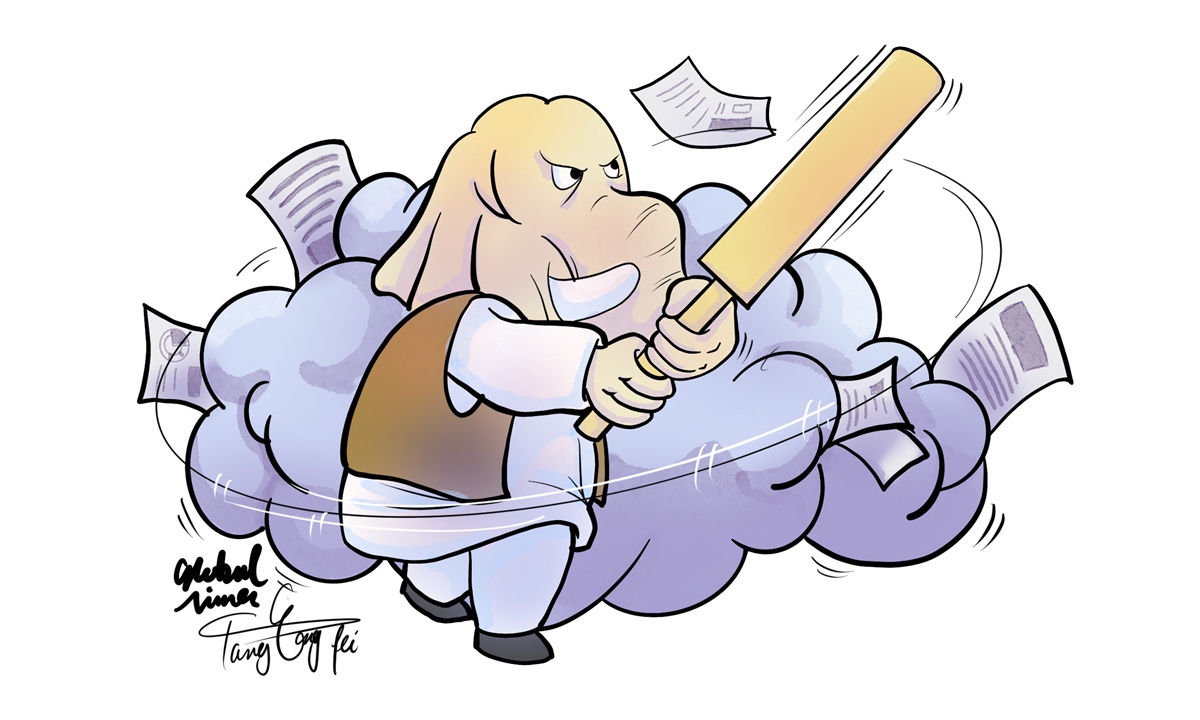
Illustration: Tang Tengfei/GT
After failing to gain any advantage by stirring up tension at the border with China, which drew stern responses from Chinese soldiers, New Delhi has shifted its out-of-control jingoism toward a more vulnerable target - Chinese businesses operating in India. Over the past several months, Indian authorities have banned dozens of Chinese mobile apps and raided local branches of many Chinese firms in shady "tax investigations."
This arbitrary crackdown campaign against Chinese businesses is becoming increasingly unhinged. This week, the Indian government has reportedly blocked access to 54 mobile apps, most of which are operated by Chinese firms. Then on Wednesday, Chinese telecom giant Huawei Technologies confirmed earlier media reports that Indian tax authorities raided multiple offices of the firm and questioned its local employees. In a statement, Huawei said that it was confident that its operations in the South Asian country "are firmly compliant with all laws and regulations" and that it would "fully cooperate" with Indian authorities.
Huawei's response is standard for any business caught in such circumstances; however, let's be clear, Indian authorities' raid most likely has nothing to do with the Chinese firm's compliance issues, but has a great deal to do with the increasing hostility of officials in New Delhi toward China. Before Huawei, several Chinese companies, including smartphone maker Xiaomi, have already been targeted. In January, Xiaomi was ordered to pay 6.53 billion rupees ($87.8 million) for unpaid taxes alleged by Indian authorities.
Considering Indian authorities' hostile words and deeds toward China and the clearly coordinated campaign against Chinese firms, it should be abundantly obvious for any sensible person to see that India's recent actions are nothing but politically-motivated crackdowns on businesses from China, which is considered by some over-confident Indian officials as a rival.
Chinese officials have expressed concern over Indian authorities' actions against Chinese businesses and have repeatedly called on the Indian side to treat Chinese firms fairly. Commenting on India's latest raid of Huawei offices and bans on Chinese apps, a spokesperson for the Chinese Commerce Ministry on Thursday mounted a noticeably stronger response, calling the actions "a series of crackdown measures" that have seriously harmed the legitimate rights and interests of Chinese firms. "For that, China expresses serious concern," the spokesperson said.
Last month, the ministry said that China had expressed "concern" over Indian actions against Chinese firms and over Indian's investment environment. The different wordings in China's responses also clearly highlight Chinese officials' growing displeasure with India's rapidly escalating crackdown campaign.
However, though New Delhi appears to be constantly testing China's patience, Chinese officials have and will likely continue to avoid being dragged into tit-for-tat measures with India. Some Indian authorities are sparing no efforts in picking a fight with China to bolster their bizarre and frankly pathetic sense of pride and confidence, but it is China that holds the upper hand and the initiative to determine what happens next. This may fall into deaf ears of some anti-China forces, but China's foreign policy has always been focused on pursuing win-win development - not confrontation.
Still, that does not mean China should sit idle while authorities in India, or anywhere for that matter, constantly attack Chinese businesses' legal rights and interests through brazen crackdown campaigns. There are many areas where Chinese officials can help businesses safeguard their interests, including offering legal services and support and lodging formal complaints.
Also, in light of growing foreign crackdowns against Chinese businesses in recent years, China has adopted an anti-foreign sanctions law, which stipulates that the country has the right to take corresponding countermeasures if other countries take discriminatory restrictive measures against Chinese citizens or organizations. With this, we believe China will take necessary measures to protect Chinese interests overseas wherever they face discriminatory actions.
For India, which is notorious for its opaque regulatory system and profound economic protectionism, the crackdown campaign against Chinese businesses will not just hurt Chinese interests but also further exacerbate the South Asian country's already-gloomy economic prospects.
The author is an editor with the Global Times. bizopinion@globaltimes.com.cn




